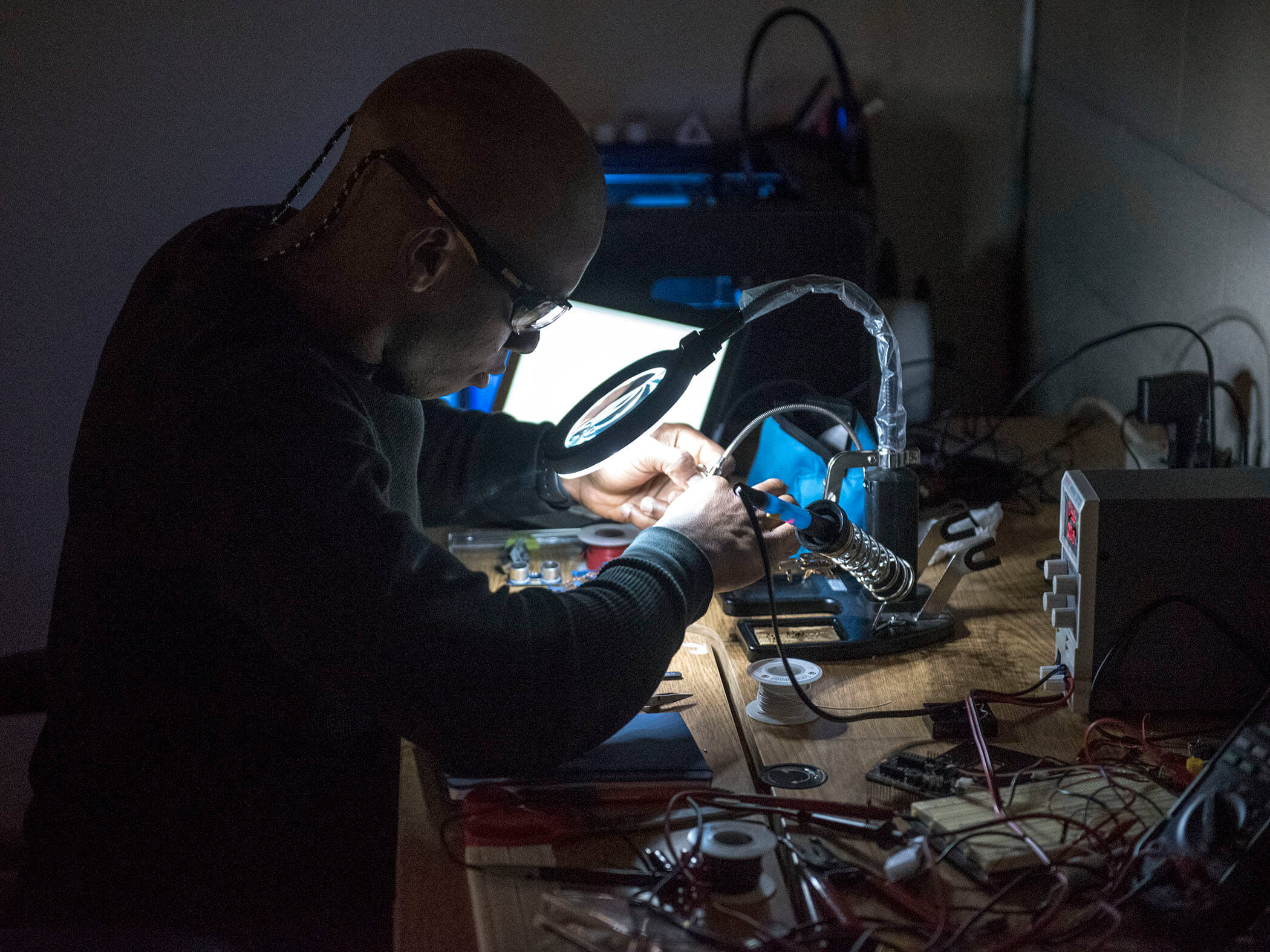The Bachelor of Science in Engineering Technology—Product Development concentration
is a multidisciplinary, manufacturing-based curriculum designed to educate and prepare
students to be multifunctional, creative, and knowledgeable leaders and participants
of product design teams.
Taking New Products From Concept to Market
Students in this program develop skills to help solve the myriad of problems associated with taking a product from conception through design, prototyping, testing and tooling, and into production. Graduates gain fundamental technical knowledge and also an understanding of the tools, techniques, and processes commonly used throughout industry to rapidly take new products from concept to market including visualization, computer-aided design (CAD), computernumerical control (CNC), 3D printing, and model building.

Concentration Overview
Goals:
Outcomes:
The program in Product Development at East Tennessee State University (ETSU) provides education and training to produce graduates who:
- are technically qualified and possess the fundamentals of their disciplines to function effectively within a global enterprise.
- can function effectively as technologists in the state and regional businesses and industries dealing with product development, design, and service/support systems.
- can function effectively in team-oriented, open-ended activities in a product development environment.
- can obtain professional goals, achieve desired outcomes, and seek growth opportunities.
- have the knowledge, abilities and skills required to adapt to evolving technological situations and pursue life-long learning.
- possess the ability to communicate effectively in oral, written, and graphical/visual modes, and
- use acceptable Industry Standards and ethical judgments to identify, evaluate and economically solve complex problems.
Curriculum
-
General Education
ENGL 1010 Foundations in Writing
ENGL 1020 Written Communication & Critical ThinkingCOMM 2045 Public Speaking
Literature (choose 1)
Fine Arts Elective (choose 1)
ENTC 3020 Technology & Society
PYSC 1310 Introduction to Psychology
HIST 2010 The United States to 1877
HIST 2020 The United States since 1877
MATH 1530 Probability and Statistics – Noncalculus
PHYS 2010 General Physics I Noncalculus
PHYS 2011 General Physics Laboratory I – Noncalculus
CHEM 1110 General Chemistry
CHEM 1111 General Chemistry Laboratory I
CSCI 1100 Using Information Technology -
Technology Core Requirements
ENTC 1510 - Student in University
ENTC 2170 - CADD (Computer Aided Design Drafting)
ENTC 3030 - Technical Communication
ENTC 4017 - Industrial Supervision
ENTC 2060 - Project Scheduling
METC 1140 - Fundamentals of Engineering Analysis
MATH 1910 - Calculus I
MATH 1920 - Calculus II
ENTC 4600 - Technical Practicum (4 credits)
or
ENTC 4989 - Internship/Cooperative Education (1-4 credits) (4 credits required)
or
ENTC 4999 - Internship/Cooperative Education (1-4 credits) (4 credits required)
Note: Culminating Experience must be approved by the department chair and program coordinator.
-
Product Development Core
ENTC 1120 - Manufacturing Processes and Specification
ENTC 2200 - Machine Tool Technology
ENTC 2310 - Electrical Principles
ENTC 3710 - Manual Numerical Control Programming
ENTC 4357 - CIM Applications
-
Technical Support Requirements
DIGM 1500 - Principles of Digital Game Design
Advisor Approved Elective
PHYS 2020 - General Physics II-Noncalculus
and
PHYS 2021 - General Physics Laboratory II-Noncalculus
or
CHEM 1120 - General Chemistry Lecture II
and
CHEM 1121 - General Chemistry Laboratory II
or
HSCI 2010 - Anatomy and Physiology I
and
HSCI 2011 - Anatomy and Physiology Laboratory I
Student much also choose two of the following areas (one of the choices must be #1 or #2):
-
Electronics and Communication
ENTC 2320 - Electronics I
ENTC 3370 - Electronics-Digital Circuits
ENTC 4277 - Instrumentation and Process Control
Choose at least 1 or more of the following:
ENTC 3310 - Circuit Analysis
ENTC 3340 - Electrical Machinery
ENTC 4337 - Microprocessors
-
Manufaturing and Materials
ENTC 3600 - Manufacturing Technology
Note: Cooperative Education (ENTC 4989/ENTC 4999) may be substituted for ENTC 3600.
Choose at least 1 or more of the following:
ENTC 1600 - Introduction to Technology Education
ENTC 2510 - Introduction to Robotics
ENTC 3620 - Thermal and Fluid Technologies
ENTC 4237 - Ergonomics and Process Optimization
ENTC 4277 - Instrumentation and Process Control
-
Digital Media and Visualization
ARTA 1140 - Core Studio II
DIGM 2530 - High-Fidelity Modeling for Entertainment
DIGM 2750 - 3D Fundamentals
DIGM 3110 - 3D Model Design
-
Construction and Architecture
ARTA 1140 - Core Studio II
DIGM 2530 - High-Fidelity Modeling for Entertainment
DIGM 2750 - 3D Fundamentals
DIGM 3110 - 3D Model Design
ENTC 2160 - Architectural CADD
ENTC 2410 - Construction Fundamentals
INTD 1105 - Interior Architecture Fundamentals
Choose at least 2 or more of the following:
INTD 2105 - Historical Interiors I
INTD 2110 - Design for Human Behavior
ENTC 2420 - Construction Documents and Planning
ENTC 2440 - Mechanical Systems
SURV 2550 - Surveying Measurement Fundamentals
Humanities
Social/Behavioral Sciences
Advisor Approved Electives
INTD 1115 may be substituted for ENTC 2160 for students taking INTD 2110.
Faculty

Bill Hemphill
Program Coordinator Associate Professor Product Development and Industrial TechnologyEngineering, Engineering Technology, Interior Architecture & Surveying
- hemphill@etsu.edu
- (423) 767-5254
- 109B Wilson-Wallis Hall
 South Dossett Drive - Closure...
South Dossett Drive - Closure...